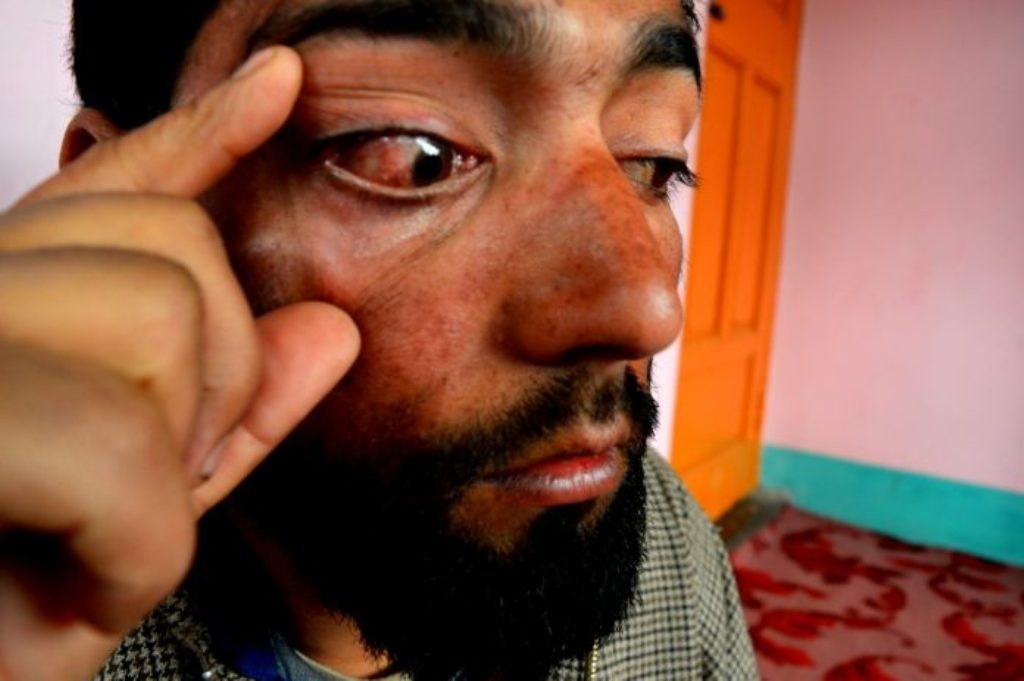Amnesty International seeks immediate ban on use of pellet guns; starts online campaign

By TwoCircles.net Staff Reporter
New Delhi: Human rights organisation Amnesty International India has asked for an immediate prohibition on use of Pellet-firing shotguns which blinded hundreds during 2016 protests in Kashmir and even lead to death of many civilians.
“Pellet-firing shotguns, which have been responsible for blinding, killing and traumatising hundreds of people in Kashmir, must be immediately banned,” said AI on Wednesday September 13 during a briefing, “Losing Sight in Kashmir: The Impact of Pellet-Firing Shotguns”.
[caption id="attachment_416556" align="aligncenter" width="1024"] Mohammad Ashraf Wani shows his right eye which was hit by pellets[/caption]
Mohammad Ashraf Wani shows his right eye which was hit by pellets[/caption]
The briefing presents the cases of 88 people whose eyesight were damaged by metal pellets fired from pump-action shotguns used by the Jammu and Kashmir Police (JKP) and Central Reserve Police Force (CRPF) between 2014 and 2017.
“In his Independence Day speech, Prime Minister Narendra Modi said that change in Kashmir will not come from guns or abuses - na goli, na gali. If the government truly means this, they must end the use of pellet-firing shotguns, which have caused immense suffering in Kashmir,” said Aakar Patel, Executive Director at Amnesty International India.
“Authorities claim the pellet shotgun is not lethal, but the injuries and deaths caused by this cruel weapon bear testimony to how dangerous, inaccurate and indiscriminate it is. There is no proper way to use pellet-firing shotguns. It is irresponsible of authorities to continue the use of these shotguns despite being aware of the damage they do.”
The pellet is a non-spherical projectile made of a malleable material, usually lead or lead alloy, designed to travel at subsonic speeds when fired from gun. The pellet guns used by the J&K Police and the CRPF in Kashmir are manufactured by Indian Ordnance Factory Ammunition Factory, Khadki (Pune). The pellets shots used in Kashmir are made up of lead-antimony alloy which are proving pestilent thus inflicting multiple organ injuries and subsequent years have seen a surge in cases of people with loss of eyesight due to its use from a very close range.
Zahoor Wani, Senior Campaigner at Amnesty International India, said, “In some cases, those injured by pellet-firing shotguns still have the metal pellets lodged in their skulls, near their eyes. Doctors have been afraid to remove the pellets, fearing that it will affect eyesight, but they are not sure what the long-term effects will be.”
“Unfortunately the central government has turned down requests for information about pellet shotguns. It is unclear if the shotguns have been properly tested, or their effects and risks assessed, or whether there is even any protocol about how they must be used. The government of Jammu and Kashmir has done little to support those injured and disabled by this weapon.”
Amnesty International India also obtained information through Right to Information applications which suggests that the use of the inherently inaccurate pellet-firing shotguns by security forces has injured other security force personnel. At least 16 personnel from the Jammu and Kashmir Armed Police were treated for pellet injuries in Kupwara in 2016. Amnesty International India wrote to the JKP and CRPF for further information, but no responses were received.
The AI also started a campaign to seek a ban on the use of pellet guns in the valley. The campaign urges the Chief Minister of Jammu and Kashmir and the Union Home Minister to immediately end the use of pellet-firing shotguns to police demonstrations; provide full reparation, including compensation and rehabilitation, to survivors; and initiate investigations into allegations of excessive use of force in cases of deaths or serious injuries by pellet-firing shotguns.
The Amnesty has also asked for Government of Jammu and Kashmir to initiate prompt, independent and impartial civilian investigations into all incidents where the use of pellet-firing shotguns led to deaths or injuries to establish whether arbitrary or excessive force was used, and where sufficient evidence is found, prosecute those suspected of responsibility in civilian courts.
